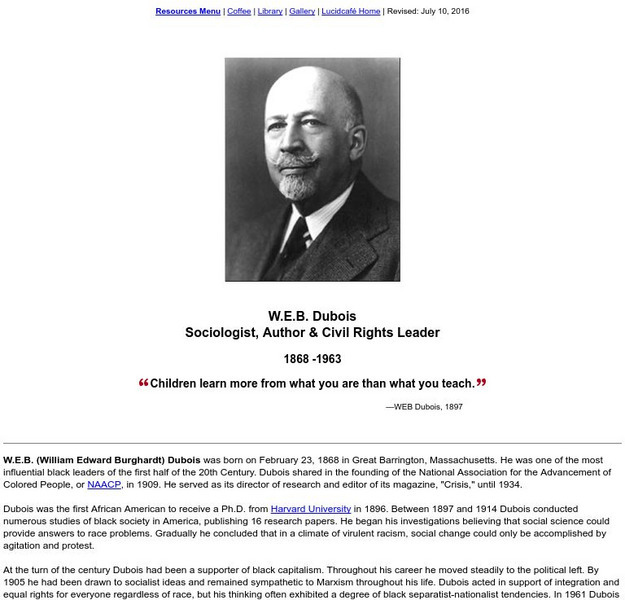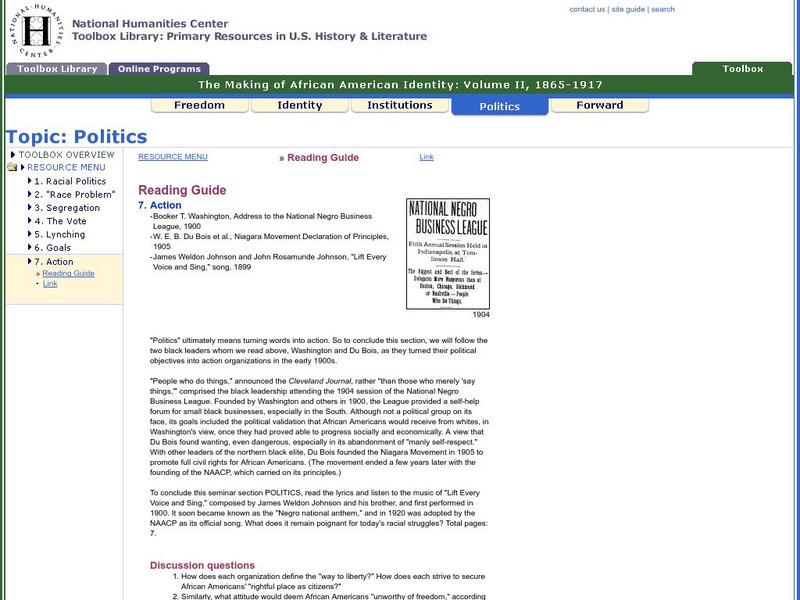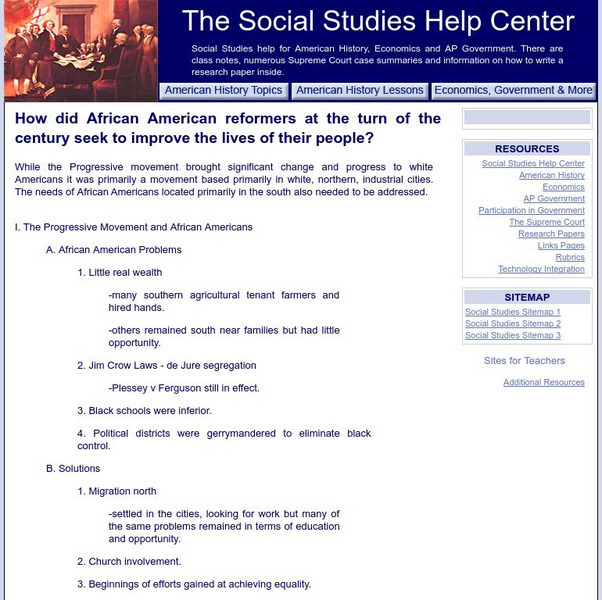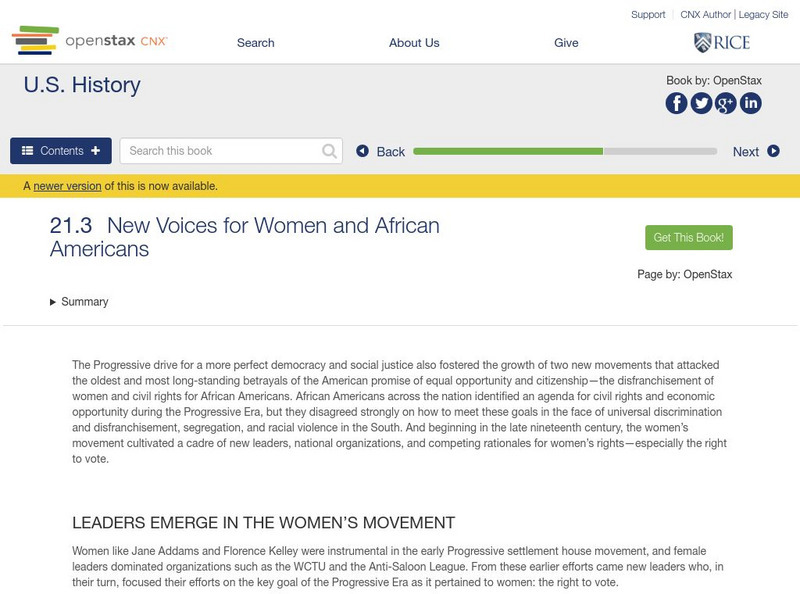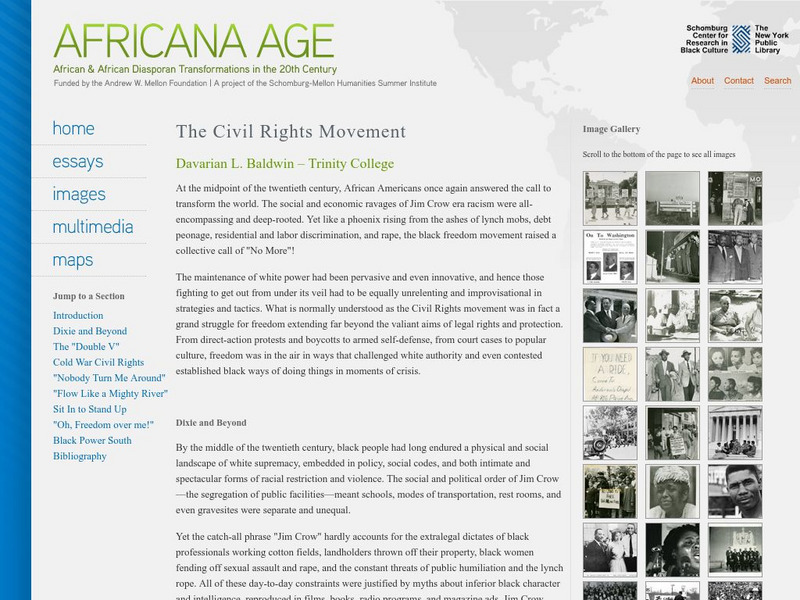Hi, what do you want to do?
Curated OER
History Matters: Du Bois on Garvey
The full title of this article by W.E.B. DuBois is "The Collapse of the Only Thing in the Garvey Movement Which Was Original or Promising." DuBois wrote in detail about the collapse of the Black Star Line, Garvey's steamship line which...
University of Massachusetts
U Mass Amherst: Du Bois Central
A collection of resources about W.E.B. DuBois, founder of the NAACP, who committed his life to opposing racial and social injustices. Includes photographs, papers, information on the Niagara Movement, exhibits, timeline, and a biography...
National Humanities Center
National Humanities Center: Toolbox Library: Making of African American Identity: Public Image
The resources examines images that illustrate and challenge black stereotypes of the late-nineteenth century, primarily focusing on W. E. B. Du Bois' African American photographs assembled for the 1900 Paris Exposition.
National Humanities Center
National Humanities Center: Toolbox Library: Leadership, Making of African American Identity: V. 2
Essay in which W. E. B. Du Bois discusses the need for a black elite. This essay, "The Talented Tenth" is provided, illustrating his efforts to improve the social standing of African Americans.
Digital History
Digital History: Two Paths Towards Equality [Pdf]
During the time of rising segregation in the late 19th century two African-American leaders offered two opposite views about how to advance civil rights for African-Americans. Read about the philosophies of those leaders. Booker T....
Robin Chew
Lucid Cafe: Du Bois Overview and Links
An overview of the life and career of W.E.B. DuBois. Provides information pertaining to his political interests and his involvement in the NAACP. Related links to other civil rights leaders and issues are presented.
Black Past
Black Past: Du Bois, William Edward Burghardt
This brief encyclopedia article gives information about W. E. B. DuBois, the controversial founder of the NAACP. He was the foremost black intellect of the early 1900's.
Curated OER
W. E. B. Du Bois
A speech by Mary Church Terrell, a letter by Booker T. Washington, a letter by W.E.B. DuBois, and the Niagara Movement's Declaration of Principles describe African American civil rights strategies in the early-twentieth century.
ClassFlow
Class Flow: Booker T. Washington and w.e.b. Du Bois
[Free Registration/Login Required] This flipchart compares and contrasts the African American leaders of the late 1800's and early 1900's. It includes Venn Diagrams, quotes, pictures, and poetry.
Siteseen
Siteseen: American Historama: Niagara Movement
Learn about the Niagara Movement, a black civil rights organization formed in 1905 formed by W. E. B. Du Bois and William Monroe Trotter.
National Humanities Center
National Humanities Center: Toolbox Library: Making of African American Identity: Goals
The full text of Booker T. Washington's plea for white support of black enterprise and W. E. B. Dubois's response are provided within this resource, in addition to a summary of their positions.
Curated OER
Wikipedia: Natl Historic Landmarks in Ma: w.e.b. Dubois Boyhood Homesite
This site contains all that remains of the childhood home of African American intellectual and activist W.E.B. Du Bois (1868-1963). The property, which belonged to his family for over 200 years, is seasonally open to the public.
National Humanities Center
National Humanities Center: Toolbox Library: African Americans, the Gilded and the Gritty: 1870 1912
A speech by Mary Church Terrell, a letter by Booker T. Washington, a letter by W.E.B. DuBois, and the Niagara Movement's Declaration of Principles describe African American civil rights strategies in the early-twentieth century.
National Humanities Center
National Humanities Center: Toolbox Library: Action, Making of African American Identity: V. 2
An address, a declaration of principle, and the Black National Anthem illustrating differing approaches to political action. The texts examine how Washington and Du Bois turned their political objectives into action organizations in the...
Curated OER
W.e.b. Du Bois
This NPR archive story discusses W. E. B. DuBois' exploration of America's ongoing struggle with race. Michele Norris presents a reexamination of The Souls of Black Folk, on the book's 100th anniversary.
Social Studies Help Center
Social Studies Help Center: Turn of the Century African American Reformers
A brief outline of information about African Americans & reform during the Progressive Era. Links to more information on Booker T. Washington, W.E.B. Du Bois, and Marcus Garvey.
PBS
Pbs: The American Experience in the 1900s
This site presents a general picture of what life was like in the United States at the turn of the century. Content includes compelling images, information, and documents about American life.
Constitutional Rights Foundation
Constitutional Rights Foundation: Three Visions for African Americans
Learning Activity on the divergent views of African American leaders. Students review and compare the competing visions of Booker T. Washington, Marcus Garvey and W.E.B. Du Bois. In addition, students choose a contemporary African...
OpenStax
Open Stax: Progressive Movement: New Voices for Women and African Americans
Examines how the women's rights movement began and how it evolved over time, followed by a look at the development of the African American civil rights movement and the different leaders that emerged during the Progressive Era.
Other
New York Public Library: Africana Age: The Civil Rights Movement
This is an extensive review of the Civil Rights movement from the 1940s to the 1960s. Read about the ways African Americans protested discrimination in employment and education over several years. Be sure to click on the images to find...
American Public Media
Say It Plain: Speech to Atlanta Cotton States and International Exposition
Booker T. Washington made a consequential speech in Atlanta in 1895, known now as the Atlanta Compromise. Read about the speech, the consessions Washington felt African-Americans needed to make, and the context in which the speech was...
Library of Congress
Loc: Naacp: The New Negro Movement
Look through the items in this Library of Congress exhibition, NAACP: A Century in the Fight for Freedom. This part of the exhibition deals with events the NAACP was involved with in the early 20th century just before the Great...
John F. Kennedy Center
The Kennedy Center: Arts Edge: Drop Me Off in Harlem
A collection of biographies, video and audio clips, and photos offer a look at the people, locations, and themes of the Harlem Renaissance.







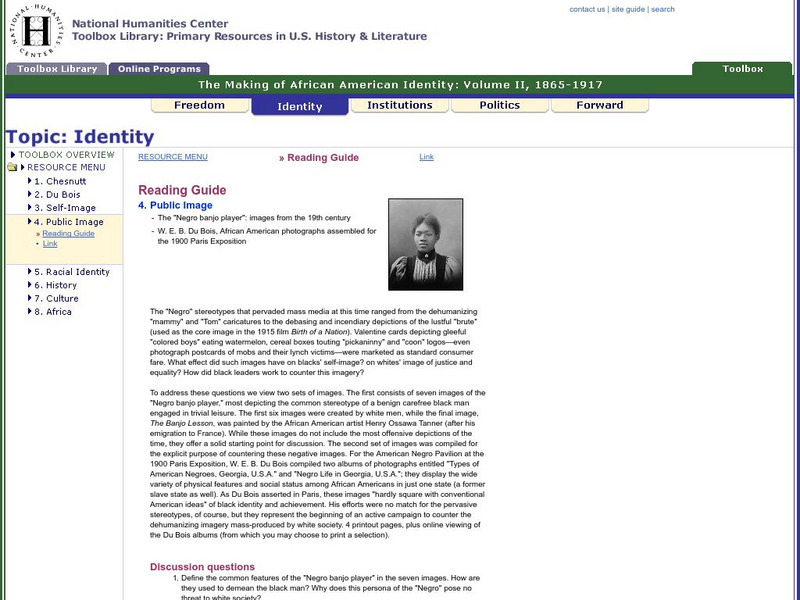
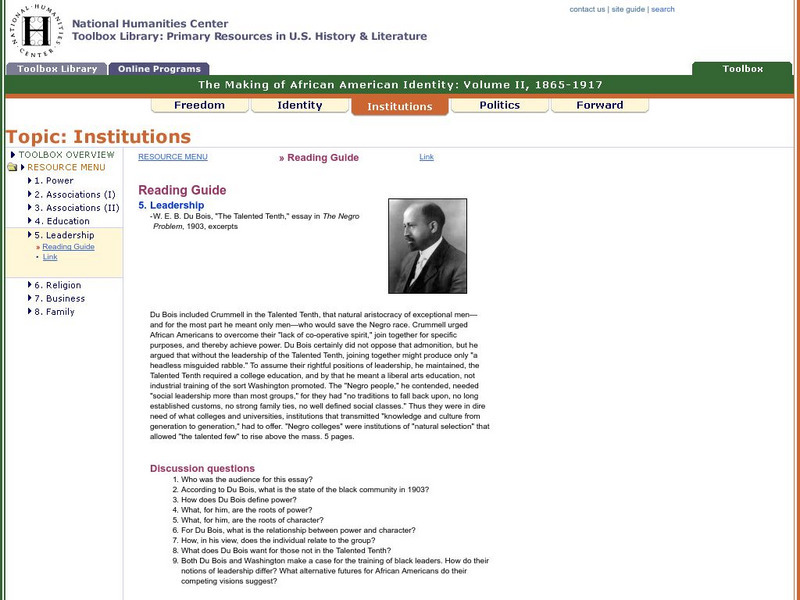
![Digital History: Two Paths Towards Equality [Pdf] Website Digital History: Two Paths Towards Equality [Pdf] Website](https://static.lp.lexp.cloud/images/attachment_defaults/resource/large/FPO-knovation.png)
